- Home
- Courtney Milan
This Wicked Gift (A Carhart Series Novella) Page 2
This Wicked Gift (A Carhart Series Novella) Read online
Page 2
“He looked honest.”
Wood scraped against the slate floor as Miss Spencer pushed her stool back and stood. William pulled his head behind the shelves before she could spot him.
“Oh, my Lord,” she swore, downright unrighteous in her wrath. “A man offered you a partnership predicated upon attempted bribery, and you didn’t question his integrity?”
“Um. No?”
William did not dare breathe into the silence that followed. Then James spoke again. “Vinny, if I must appear before a magistrate, could we claim—”
“Be quiet,” she snapped furiously. “I’m thinking.”
So was William. Frauds and cheats, if they were any good, made excessively good barristers for themselves in court. The common person could not risk a loss at law. William would not want to stand in young James’s shoes before a magistrate. He gave it even odds the boy would prevail.
“No,” Miss Spencer said, almost as if she’d heard William’s thoughts, and decided to correct him. “We’d win, but we’d have to pay a barrister. No magistrate.”
“Vinny, do we have ten pounds? Can’t we make him just go away?”
“Not if we want to pay the apothecary.”
There was a bleak silence. Likely, Miss Spencer had forgotten William was in the room. If he were a gentleman, he’d have apologized minutes ago and taken his leave.
“We are not without options,” Miss Spencer said.
Options. William had a fair idea just how many options Miss Spencer had. He suspected the number was equal to the population of single men who frequented the library—and perhaps included the married ones as well. As the reading men of London were, by definition, neither blind nor completely idiotic, he knew there were many others who entertained charged fantasies about Miss Spencer. In fact, he rather suspected that old Mr. Bellows, the wealthy butcher, would offer her marriage if she gave him the slightest encouragement. Ten pounds would be nothing to him—and the butcher was hardly alone in his lust.
William could not countenance the thought. He could not envision her beneath that fat, toothless man. And besides, the upright Miss Spencer chided her brother about bribery and petty theft. She would never stray from a husband, no matter how many teeth the man lost. If she married, William would never be able to pretend—not even on the darkest, loneliest nights—that he would one day have her.
He’d had enough dreams shattered today.
“I have a plan.” There was steel in Miss Spencer’s voice. “I’ll take care of it.”
“What must I do?” James asked instantly.
Miss Spencer was silent. “I think,” she said quietly, “you’ve done enough for now. I’ll take care of it for you. Just give me his direction.”
Silence stretched, ungracious in its length. Finally her brother heaved a sigh. “Very well. Thank you, Vinny.”
Like the foolish coward that he was, her brother complied. William could hear the scratch of pen against paper. James hadn’t even asked her what her plan entailed, or insisted that he take care of the matter himself. He didn’t care what she might have to sacrifice for him.
William’s fists clenched around the bank note in his pocket. If he were a gentleman, he’d hand Miss Spencer his ten pounds and solve all her problems.
Then again, William hadn’t been a gentleman since he was fourteen.
No. His ten pounds—his last, minuscule legacy from childhood—would buy him the one fantasy he had left. If she had to sacrifice herself, it might as well be in his honor. She’d wished him a merry Christmas.
Well, she was going to give him one.
THE ADDRESS HER BROTHER had inked was still damp on the page when Lavinia’s reverie was interrupted.
“He calls you Vinny?”
She looked up and felt her cheeks flush. It was Mr. William Q. White, leaning against the shelves. Of all the people to intrude at this moment. She’d thought the conversation had been quiet. She’d thought him safely ensconced back in the finance section, behind five shelves of books. Obviously she’d been wrong on both counts.
How much had he overheard? How embarrassed ought she to be at playing out that ridiculous drama in front of this serious man? Had she said anything stupid? And how absurd was it that, despite all that had transpired in the last half hour, her heart raced in pitter-patters because Mr. William Q. White had actually started a conversation with her?
As she always did when she was nervous, she began to babble. “Yes, he calls me Vinny. It’s a pet name for—”
“I know your Christian name, Miss Spencer.” His gaze did not move from hers. Instead, he walked across the room to her and stepped behind the counter. He stood too close. If she’d been sitting in a regular chair, she’d have had to crane her neck. Seated on a stool, her feet swinging well above the ground, she still had to lean her head back to look him in the eyes.
He smiled at her, a long, slow grin. In giddy excitement her stomach turned over. That dangerous curve of his lips was a new expression for him. Assuredly new. She would have remembered another one like it. Lavinia swallowed.
He set his hand deliberately atop hers.
Oh, she knew she should pull away. Pull away, and slap him for taking liberties with her person. But her brother had left her so cold—and his hand was so warm—and by all that was holy, after a year of encouraging Mr. William Q. White to do more than just look at her, she was not about to raise objections to a little liberty.
“I know what Vinny is short for. As it happens, I prefer Lavinia.” He leaned over her.
He said it as if he preferred her, not just her name. Lavinia’s lungs seized. She could smell the starch of his cravat. He’s going to kiss me, she thought. Her nipples pressed, painfully peaked, against her stays. His thumb ran along her wrist, down the curve of her fingers. Lavinia felt her lips part. She might even have arched up toward him, just a little. She focused on the pink of his mouth, so close to hers.
He’s going to kiss me, and I am going to let him.
Instead, he released her hand. She could still feel the imprint of his fingers against hers as he stepped away.
“Miss Spencer, I do believe we’ll talk tomorrow.” He smiled. Before she could point out that tomorrow was Sunday, and the lending library would therefore be closed, he tipped his hat at her and set it on his head. “Come find me at one.”
And then Mr. William Q. White strode away, the tails of his coat flapping at her. The bell jingled. The door shut. Lavinia raised her burning hand to her unkissed lips and looked down.
It was only then she realized he hadn’t been angling for a kiss at all.
He’d taken the slip of foolscap containing the address of the man who’d cheated James.
Chapter Two
LAVINIA WOKE TO A CLOUD of thick, choking smoke. Her first panicked thought was that the books downstairs had somehow caught fire, that their livelihood, half owned by creditors, was going up in flames. But then her conscious mind caught up to her racing fears and she correctly cataloged the smell.
It was the more mundane—and rather more unpleasant—scent of burning porridge.
Frowning, Lavinia pulled a wrapper over her nightdress and padded out into the front room.
James, his hands blackened with soot, was juggling a pot. The vessel let off billows of gray smoke, its sides streaked black.
“Ah,” he said essaying a weak smile. “Lavinia! I made breakfast for you.”
She didn’t dare respond, not even with so little as a raised eyebrow.
He peered into the pot, frowning. “There’s still some white bits in here. Isn’t it odd that porridge turns yellow when it burns? I’d have thought it would go directly to black.” He prodded the mass with a spoon, then shrugged and looked up. “Want some?”
Over fifteen years, Lavinia had become quite fluent in the foreign tongue known as Younger Brother. It was a tricky language, mostly because it employed words and phrases that sounded, deceptively, as if they were proper English.
&n
bsp; For instance, the average woman off the street would have thought that James had just offered her burned porridge. Lavinia knew better. What James had actually said was, “Sorry I stole your money. I made you breakfast by way of apology. Forgive me?”
Lavinia sighed and waved her hand. “Give me a bowl.”
That was Younger Brother for: “Your porridge is disgusting, but I love you nonetheless.”
By unspoken consensus, as they prepared a tray to bring to their father in bed, James cut a slice of bread and Lavinia slipped it on a toasting fork. Ill as their father was, there was no need to punish him with either the details of James’s transgression or an indigestible breakfast.
And perhaps, Lavinia thought as she choked down the nauseating glutinous mass, that was the essence of love. Love wasn’t about reasons. It wasn’t about admiring fine qualities. Love was a language all on its own, composed of gestures that seemed incomprehensible, perhaps even pointless, to the outside observer.
Speaking of the inarticulate language of love, what had Mr. William Q. White meant by his outrageous behavior last night? Come find me, he’d said. His words had seemed to come straight from her imagination.
But surely he hadn’t meant for her to look up the address he’d given when he applied for a subscription? Surely he didn’t mean she should pay him a visit? A woman who intended to keep her virtue did not visit a man, even if he did have lovely eyes and a voice that spoke of dark seduction. Especially if he had those features. Lavinia had gone nineteen years without making any errors at all on that front.
As it happens, I prefer Lavinia. Come find me.
She didn’t need to remember the heat of his gaze as he looked at her to know he hadn’t asked her to pay an innocent little morning call.
And yet what had her streak of perfection gotten her? Months and months of painstaking tallies had done her no good. Her coins were gone and the very thought of the barren holiday that awaited her family made her palms grow cold.
This somewhat dubious rationale brought Lavinia to the dark, imposing door of 12 Norwich Court. It was not quite an hour after noon, but a dark gray cloud hovered over the tall, bulky houses and blocked all hint of the feeble sun. A wild wind whipped down the street, carrying with it the last few tired leaves from some faraway square and the earthy scent of winter mold. Lavinia pulled her cloak about her in the gloom.
This residential street—little more than a dingy alley, really—was occupied at present only by an orange cat. The animal was a solitary spot of color against the gray-streaked buildings. In the next hour, Lavinia’s life could change. Completely. Before she could reconsider, she rapped the knocker firmly against the door. She could feel the blood pounding in her wrists.
And then she waited. She’d almost convinced herself there was nothing unsafe or untoward about this visit. According to the subscription card, Mr. William Q. White had a room on the second floor of a house owned by Mrs. Jane Entwhistle—a cheerful, elderly widow who sometimes visited the lending library in search of gothic novels. Mrs. Entwhistle would doubtless be willing to play chaperone at Lavinia’s request. She might even be kindhearted enough to look the other way.
The door opened.
“Oh, Mrs. Entwhistle,” Lavinia started. And then she stopped.
It was not the bustling widow who’d opened the door, nor Mary Lee Evans, the scullery maid who was the object of Mrs. Entwhistle’s complaints.
Behind the threshold, Mr. William Q. White stood in his shirtsleeves. He was in a shocking state of dishabille. Beneath that single layer of rough white linen, Lavinia could make out the broad line of his shoulders, and the sleek curve of muscles. His cuffs had been folded up, and she could see fine lines of hair at his wrist. She peeped behind him. Surely the respectable Mrs. Entwhistle wouldn’t countenance such laxity of dress.
The widow was nowhere to be seen.
She glanced down the street. The cat sat, licking its paws, on a step three houses down.
“Mrs. Entwhistle is gone for the week to celebrate Christmas with her granddaughter.” He raised his gaze to her. She ought to have felt cold; his every word came out in a puff of white in the chilled air. But his eyes were hot, and suddenly, so was Lavinia.
“Mary Lee?” she asked in a squeak.
“Given the week off. Come in before you catch your death.”
Her imagination gave those words a wicked quality—as if he’d asked her to catch something else instead. It was that accent again, that lilt in his voice that she just couldn’t place. It made her think of unspeakable things, no matter how innocent his intentions.
But no, it was not just her imagination. It was a terribly wicked notion to enter a home alone with a young, attractive—very attractive—partially clothed man. Why, he might take liberties. He might take lots of them.
He smiled at her, a mischievous grin that unfolded across his face. Maybe it was her imagination again, but the smile didn’t reach his eyes.
“I can’t come in. It wouldn’t be proper.”
“I give you my word,” he said carefully, “that I shall not do anything to you without your permission.”
As reassurances went, this lacked some basic quality of…assurance.
“Your word as a gentleman?”
His lip curled slightly. “I’m hardly that.”
Well, then. “What do you mean, without my permission? I could easily give permission to—”
She stopped herself before she could complete the sentence. Not only because she was embarrassed by her unintended admission, but because if she started cataloging the things she might let him do, given the proper persuasion, she would never stop with a mere peck on the cheek. He was a mere twelve inches from her, on the threshold. She could see him complete her sentence. His pupils dilated. His gaze slipped down her body, a caress that was almost palpable. His Adam’s apple bobbed, once.
Still he didn’t say anything. It was one thing to have him look the other way when she wished him a merry Christmas, or asked him what he’d thought of the Adam Smith he returned. It was quite another to admit she wanted a kiss, and to have him remain silent.
“Say something,” Lavinia begged. “Say anything.”
He moved closer. “Come inside with me.” His voice enfolded her like warm velvet. And still he looked at her, those dark eyes boring into her, then settling against her lips like a caress.
No. She was past the point of fooling herself. Whatever Mr. William Q. White had done with the address, she had little doubt that if she followed him inside, she would likely be kissed quite thoroughly indeed. She’d known it all along. Perhaps, even, that was why she’d come. And this time he’d said aloud what she’d always imagined. Come inside with me.
He was going to kiss her. There was nobody about to see her lapse. Even the cat had disappeared. It was nearly Christmas, and Lavinia didn’t suppose she would get any other gift this year. She was cold, and his breath was warm.
She untied her bonnet strings and followed him inside.
The entry was cold and dark and empty, and Mr. White didn’t even stop to take her things. Instead, he hustled her up two flights of stairs. The halls of the second landing lacked the soft, feminine furnishings that Mrs. Entwhistle employed downstairs. Instead, they had a Spartan, military look. The walls were the stark yellow of age-faded whitewash.
Mr. White glanced at her, his lips pressed together, and then turned down a silent hall into a back room. The furniture was austere wood. From ceiling to baseboard, there was not even a hint of color on the unadorned walls. A white washstand bore a white pitcher and—a sign that she was in territory that was undeniably masculine—a black-handled razor. A single window looked out over a desolate, gray yard. A solitary tree, stripped to its bare branches by winter, huddled sullenly in the center.
And Lavinia was looking everywhere but in the corner, where there was a bed. It was as cold and forbidding as the rest of the room, made perfectly, without the smallest wrinkle in the white linens.
A bed. This visit was becoming most improper indeed.
Mr. White pulled up a chair—the lone chair in the room, a straight-backed wooden affair—for Lavinia. She sat.
He walked over to a small table and picked up a piece of paper.
“I’ve purchased your brother’s promissory note,” he said stiffly.
She hadn’t quite known what to expect. “I hope you didn’t pay the full ten pounds for it,” she said. “Why would you do such a thing?”
He sat on the bed and fiddled with his rolled-up cuffs. She could see the blue lines of veins in his wrist. His fingers were quite long, and Lavinia could imagine them touching her cheek, a gentle tap-tap, in tune with the ditty he beat on his palm now. She wondered whether Mrs. Entwhistle often visited relatives, and if so, whether Mr. White regularly entertained women in his quarters.
But no. He was far too ill at ease. A practiced seducer would have plied her with brandy. He would have made her laugh. Certainly he would not have made her sit in this hard and uncomfortable chair. And he would not have said so little.
“Why do you suppose,” he said, “I’ve asked to talk with you rather than your brother?”
“Because I’m more reasonable than him?”
“Because,” he said uneasily, not quite meeting her eyes, “you—or rather, your body—is the only currency that can persuade me to part with that note.”
It took her a second to unravel his meaning. He wasn’t hoping for a kiss given out of gratitude. He wasn’t even going to attempt a somewhat awkward seduction. Instead, he was trying to coerce her. There had been something magical about the looks he’d given her, occluded as they’d been with his two-word greetings. She’d felt as if they were uncovering a mutual secret—a world where Lavinia could forget the strain of trying to hold her family together. She could pretend for just one instant that nothing mattered but that she was a young woman, desired by an attractive young man.
But her own wishes were of no importance to him. If he was trying to force her in this ridiculous fashion, he saw nothing mutual at all about their desire. She had the sudden feeling of vertigo, as if the room were spinning about her, the floor very far away. As if she’d added all the lines in the ledger between them, and found that her tally did not match his coins.

 Her Every Wish
Her Every Wish Midnight Scandals
Midnight Scandals After the Wedding
After the Wedding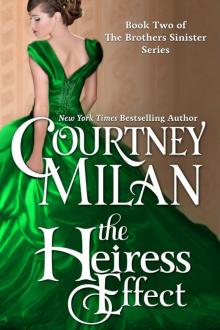 The Heiress Effect
The Heiress Effect Unraveled
Unraveled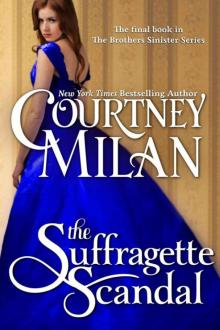 The Suffragette Scandal
The Suffragette Scandal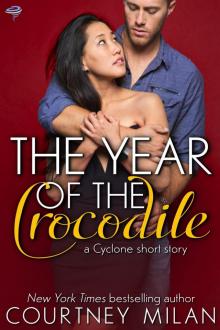 The Year of the Crocodile
The Year of the Crocodile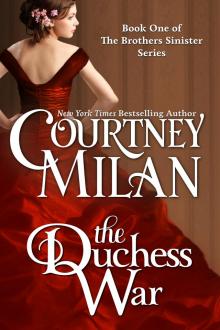 The Duchess War
The Duchess War What Happened at Midnight
What Happened at Midnight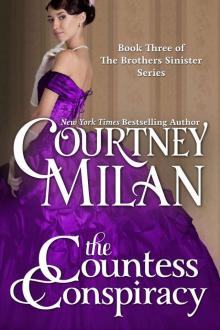 The Countess Conspiracy
The Countess Conspiracy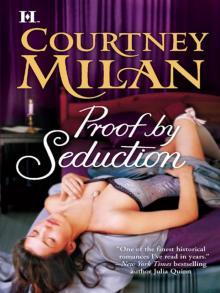 Proof by Seduction
Proof by Seduction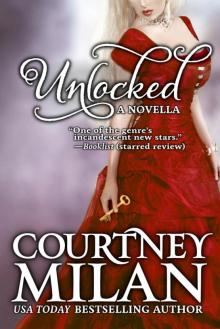 Unlocked
Unlocked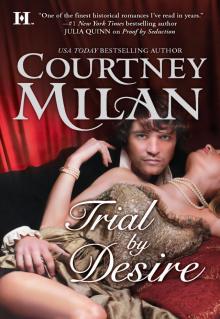 Trial by Desire
Trial by Desire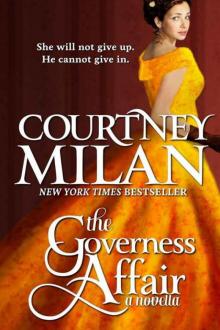 The Governess Affair
The Governess Affair Unveiled
Unveiled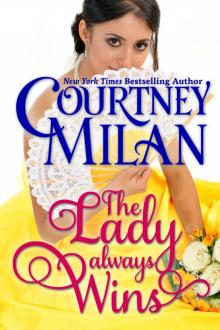 The Lady Always Wins
The Lady Always Wins Trade Me
Trade Me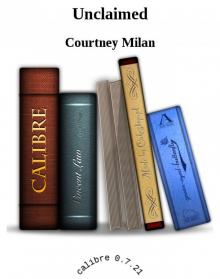 Unclaimed
Unclaimed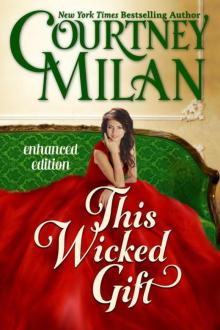 This Wicked Gift
This Wicked Gift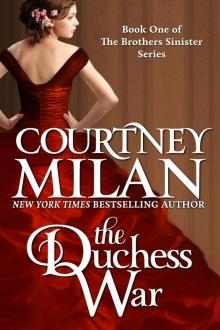 The Duchess War (The Brothers Sinister)
The Duchess War (The Brothers Sinister) Hamilton's Battalion: A Trio of Romances
Hamilton's Battalion: A Trio of Romances The Turner Series
The Turner Series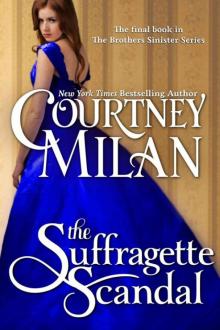 The Suffragette Scandal (The Brothers Sinister)
The Suffragette Scandal (The Brothers Sinister)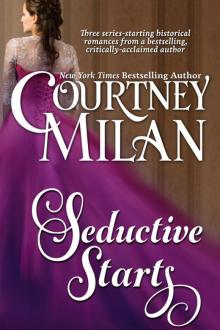 Seductive Starts
Seductive Starts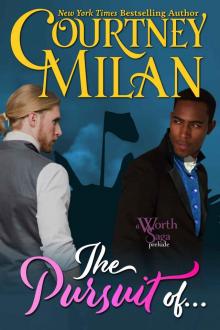 The Pursuit Of…
The Pursuit Of… Hamilton's Battalion
Hamilton's Battalion The Carhart Series
The Carhart Series Seven Wicked Nights
Seven Wicked Nights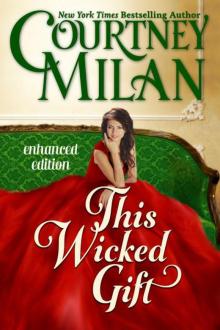 This Wicked Gift (A Carhart Series Novella)
This Wicked Gift (A Carhart Series Novella)